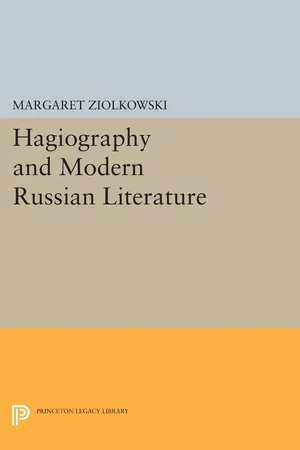
- 282 pages
- English
- PDF
- Available on iOS & Android
Hagiography and Modern Russian Literature
About this book
The heritage of medieval hagiography, the diverse and voluminous literature devoted to saints, was much more important in nineteenth-century Russia than is often recognized. Although scholars have treated examples of the influence of hagiographic writing on a few prominent Russian writers, Margaret Ziolkowski is the first to describe the vast extent of its impact. Some of the authors she discusses are Kondratii Ryleev, Aleksandr Bestuzhev-Marlinskii, Fedor Dostoevsky, Leo Tolstoy, Nikolai Leskov, Gleb Uspenskii, Dmitrii Merezhkovskii, and Maksimilian Voloshin. Such writers were often exposed to saints' lives at an early age, and these stories left a deep impression to be dealt with later, whether favorably or otherwise.
Professor Ziolkowski identifies and analyzes the most common usages of hagiographic material by Russian writers, as well as the variety of purposes that inspired this exploitation of their cultural past. Tolstoy, for instance, employed hagiographic sources to attack the organized church and the institution of monasticism. Individual chapters treat the influence of hagiography on the poetry of the Decembrists, reworkings of specific hagiographic legends or tales, and the application of hagiographic conventions and features to contemporary characters and situations.
Originally published in 1988.
The Princeton Legacy Library uses the latest print-on-demand technology to again make available previously out-of-print books from the distinguished backlist of Princeton University Press. These editions preserve the original texts of these important books while presenting them in durable paperback and hardcover editions. The goal of the Princeton Legacy Library is to vastly increase access to the rich scholarly heritage found in the thousands of books published by Princeton University Press since its founding in 1905.
Tools to learn more effectively

Saving Books

Keyword Search

Annotating Text

Listen to it instead
Information
Table of contents
- Cover
- Contents
- Preface
- Note on Transliteration and Dates
- Abbreviations
- 1. Introduction
- 2. Hagiography and History: The Saintly Prince in the Poetry of the Decembrists
- 3. Hagiography Revised: Adaptations of Legends and Tales
- 4. Neo-Hagiography: The Saintly Monk and the Holy Fool in Modern Dress
- 5. Hagiography and the Rigorous Hero: The Josephite Type in Later Russian Literature
- 6. Anti-Hagiography: Tolstoy's Assault on Orthodoxy
- Conclusion
- Index
Frequently asked questions
- Essential is ideal for learners and professionals who enjoy exploring a wide range of subjects. Access the Essential Library with 800,000+ trusted titles and best-sellers across business, personal growth, and the humanities. Includes unlimited reading time and Standard Read Aloud voice.
- Complete: Perfect for advanced learners and researchers needing full, unrestricted access. Unlock 1.4M+ books across hundreds of subjects, including academic and specialized titles. The Complete Plan also includes advanced features like Premium Read Aloud and Research Assistant.
Please note we cannot support devices running on iOS 13 and Android 7 or earlier. Learn more about using the app